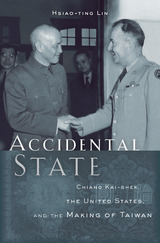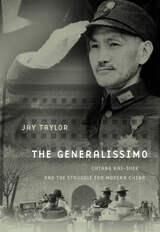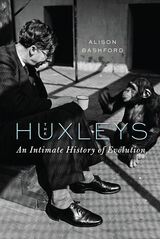
The existence of two Chinese states—one controlling mainland China, the other controlling the island of Taiwan—is often understood as a seemingly inevitable outcome of the Chinese civil war. Defeated by Mao Zedong, Chiang Kai-shek’s Nationalists fled to Taiwan to establish a rival state, thereby creating the “Two Chinas” dilemma that vexes international diplomacy to this day. Accidental State challenges this conventional narrative to offer a new perspective on the founding of modern Taiwan.
Hsiao-ting Lin marshals extensive research in recently declassified archives to show that the creation of a Taiwanese state in the early 1950s owed more to serendipity than careful geostrategic planning. It was the cumulative outcome of ad hoc half-measures and imperfect compromises, particularly when it came to the Nationalists’ often contentious relationship with the United States.
Taiwan’s political status was fraught from the start. The island had been formally ceded to Japan after the First Sino-Japanese War, and during World War II the Allies promised Chiang that Taiwan would revert to Chinese rule after Japan’s defeat. But as the Chinese civil war turned against the Nationalists, U.S. policymakers reassessed the wisdom of backing Chiang. The idea of placing Taiwan under United Nations trusteeship gained traction. Cold War realities, and the fear of Taiwan falling into Communist hands, led Washington to recalibrate U.S. policy. Yet American support of a Taiwan-based Republic of China remained ambivalent, and Taiwan had to eke out a place for itself in international affairs as a de facto, if not fully sovereign, state.

Once a powerful figure who reversed the disintegration of China and steered the country to Allied victory in World War II, Chiang Kai-shek fled into exile following his 1949 defeat in the Chinese civil war. As attention pivoted to Mao Zedong’s communist experiment, Chiang was relegated to the dustbin of history.
In Chiang Kai-shek’s Politics of Shame, Grace C. Huang reconsiders Chiang’s leadership and legacy by drawing on an extraordinary and uncensored collection of his diaries, telegrams, and speeches stitched together by his secretaries. She paints a new, intriguing portrait of this twentieth-century leader who advanced a Confucian politics of shame to confront Japanese incursion into China and urge unity among his people. In also comparing Chiang’s response to imperialism to those of Mao, Yuan Shikai, and Mahatma Gandhi, Huang widens the implications of her findings to explore alternatives to Western expressions of nationalism and modernity and reveal how leaders of vulnerable states can use potent cultural tools to inspire their country and contribute to an enduring national identity.

Once a powerful figure who reversed the disintegration of China and steered the country to Allied victory in World War II, Chiang Kai-shek fled into exile following his 1949 defeat in the Chinese civil war. As attention pivoted to Mao Zedong’s communist experiment, Chiang was relegated to the dustbin of history.
In Chiang Kai-shek’s Politics of Shame, Grace C. Huang reconsiders Chiang’s leadership and legacy by drawing on an extraordinary and uncensored collection of his diaries, telegrams, and speeches stitched together by his secretaries. She paints a new, intriguing portrait of this twentieth-century leader who advanced a Confucian politics of shame to confront Japanese incursion into China and urge unity among his people. In also comparing Chiang’s response to imperialism to those of Mao, Yuan Shikai, and Mahatma Gandhi, Huang widens the implications of her findings to explore alternatives to Western expressions of nationalism and modernity and reveal how leaders of vulnerable states can use potent cultural tools to inspire their country and contribute to an enduring national identity.

One of the most momentous stories of the last century is China’s rise from a self-satisfied, anti-modern, decaying society into a global power that promises to one day rival the United States. Chiang Kai-shek, an autocratic, larger-than-life figure, dominates this story. A modernist as well as a neo-Confucianist, Chiang was a man of war who led the most ancient and populous country in the world through a quarter century of bloody revolutions, civil conflict, and wars of resistance against Japanese aggression.
In 1949, when he was defeated by Mao Zedong—his archrival for leadership of China—he fled to Taiwan, where he ruled for another twenty-five years. Playing a key role in the cold war with China, Chiang suppressed opposition with his “white terror,” controlled inflation and corruption, carried out land reform, and raised personal income, health, and educational levels on the island. Consciously or not, he set the stage for Taiwan’s evolution of a Chinese model of democratic modernization.
Drawing heavily on Chinese sources including Chiang’s diaries, The Generalissimo provides the most lively, sweeping, and objective biography yet of a man whose length of uninterrupted, active engagement at the highest levels in the march of history is excelled by few, if any, in modern history. Jay Taylor shows a man who was exceedingly ruthless and temperamental but who was also courageous and conscientious in matters of state. Revealing fascinating aspects of Chiang’s life, Taylor provides penetrating insight into the dynamics of the past that lie behind the struggle for modernity of mainland China and its relationship with Taiwan.

Two hundred years of modern science and culture told through one family history.
This momentous biography tells the story of the Huxleys: the Victorian natural historian T. H. Huxley (“Darwin’s Bulldog”) and his grandson, the scientist, conservationist, and zoologist Julian Huxley. Between them, they communicated to the world the great modern story of the theory of evolution by natural selection. In The Huxleys, celebrated historian Alison Bashford writes seamlessly about these omnivorous intellects together, almost as if they were a single man whose long, vital life bookended the colossal shifts in world history from the age of sail to the Space Age, and from colonial wars to world wars to the cold war.
The Huxleys’ specialty was evolution in all its forms—at the grandest level of species, deep time, the Earth, and at the most personal and intimate. They illuminated the problems and wonders of the modern world and they fundamentally shaped how we see ourselves, as individuals and as a species.
But perhaps their greatest subject was themselves. Bashford’s engaging, brilliantly ambitious book interweaves the Huxleys’ momentous public achievements with their private triumphs and tragedies. The result is the history of a family, but also a history of humanity grappling with its place in nature. This book shows how much we owe—for better or worse—to the unceasing curiosity, self-absorption, and enthusiasm of a small, strange group of men and women.
READERS
Browse our collection.
PUBLISHERS
See BiblioVault's publisher services.
STUDENT SERVICES
Files for college accessibility offices.
UChicago Accessibility Resources
home | accessibility | search | about | contact us
BiblioVault ® 2001 - 2024
The University of Chicago Press









